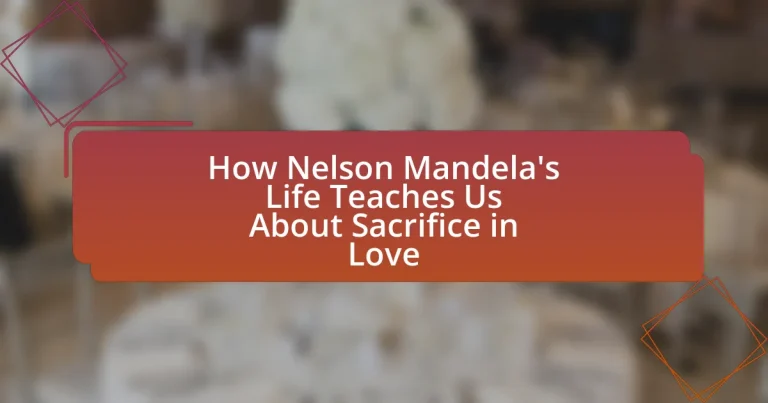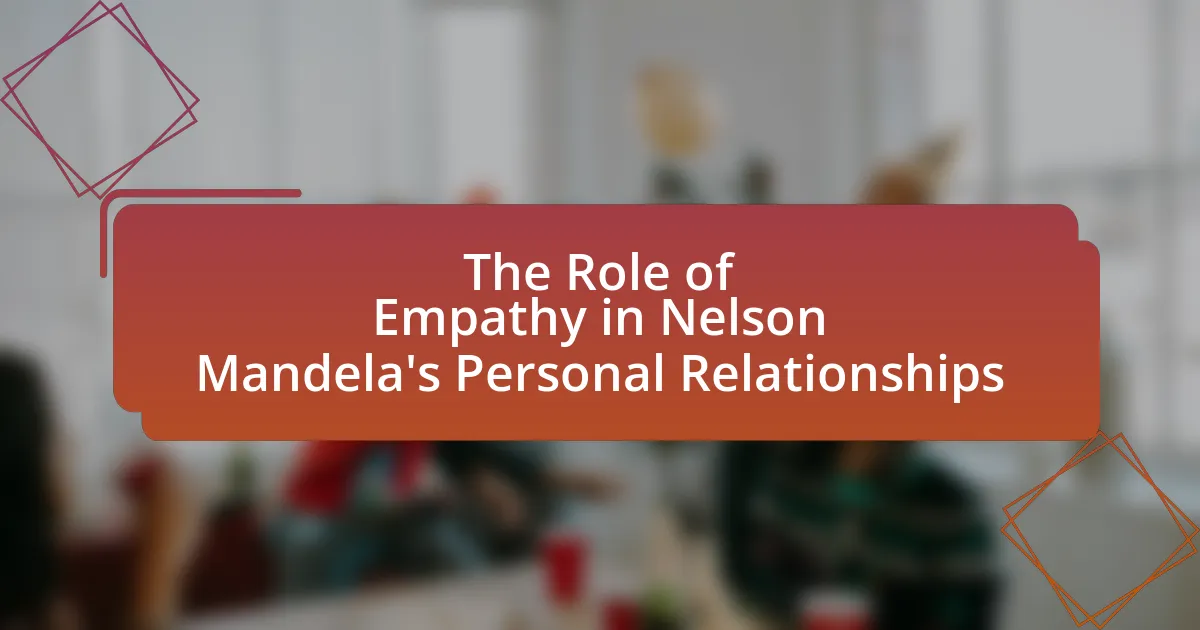Nelson Mandela’s life exemplifies the profound connection between sacrifice and love, as he dedicated 27 years of his life to imprisonment for the freedom of his people. The article explores how Mandela’s personal relationships, particularly with his family and Winnie Mandela, influenced his understanding of sacrifice, emphasizing that true love often requires selflessness and endurance. It highlights key events that shaped his philosophy on love, including his commitment to justice and reconciliation, and discusses the broader implications of his sacrifices for collective struggles against oppression. Ultimately, the article provides practical insights on how individuals can apply Mandela’s lessons on sacrifice to enhance their own relationships.
What Can We Learn from Nelson Mandela’s Life About Sacrifice in Love?
Nelson Mandela’s life teaches us that true love often requires profound sacrifice, as evidenced by his willingness to endure 27 years of imprisonment for the freedom of his people. This sacrifice exemplifies the depth of his commitment not only to his country but also to the principles of justice and equality, which are foundational to love in a broader sense. Mandela’s decision to prioritize the liberation of South Africa over his personal freedom illustrates that love can manifest through selflessness and the courage to endure hardship for the greater good. His legacy shows that love is not merely an emotion but an active choice that may demand significant personal cost, reinforcing the idea that genuine love often involves putting others’ needs above one’s own desires.
How did Nelson Mandela’s personal relationships influence his views on sacrifice?
Nelson Mandela’s personal relationships significantly shaped his views on sacrifice by illustrating the importance of commitment and resilience in the face of adversity. His deep connections with family, friends, and fellow activists, particularly during his 27 years of imprisonment, reinforced his belief that personal sacrifice was essential for the greater good of the South African struggle against apartheid. For instance, Mandela’s relationship with his first wife, Evelyn, and later with Winnie, highlighted the emotional toll of his political commitments, demonstrating that personal sacrifices often come with profound personal costs. Furthermore, Mandela’s friendships with fellow leaders like Oliver Tambo and Walter Sisulu emphasized the collective nature of sacrifice, as they all endured hardships for a shared vision of freedom. These experiences collectively informed Mandela’s understanding that true sacrifice is rooted in love and dedication to a cause greater than oneself.
What role did Winnie Mandela play in Nelson’s sacrifices for love?
Winnie Mandela played a significant role in Nelson Mandela’s sacrifices for love by being a steadfast supporter during his imprisonment and a symbol of resilience in the struggle against apartheid. Her unwavering commitment to their relationship and the anti-apartheid movement exemplified the personal sacrifices both made for their love and shared ideals. Winnie faced her own challenges, including imprisonment and public scrutiny, which highlighted the emotional toll of their separation. This dynamic underscored the profound impact of their love on Nelson’s resolve to fight for justice, as he often drew strength from their bond while enduring hardships.
How did Mandela’s family dynamics shape his understanding of love and sacrifice?
Mandela’s family dynamics profoundly shaped his understanding of love and sacrifice through the values instilled in him by his parents and the experiences of separation due to political struggles. His father, a chief, emphasized the importance of community and responsibility, teaching Mandela that love often requires selflessness and commitment to others. Additionally, Mandela’s relationship with his mother, who raised him after his father’s death, highlighted the sacrifices made for family welfare, reinforcing the idea that love involves enduring hardships for the sake of loved ones. These early lessons were further deepened by his own sacrifices during his imprisonment, where he often reflected on the love for his family and his people, illustrating that true love encompasses both personal sacrifice and a broader commitment to justice and equality.
Why is sacrifice a central theme in Mandela’s life story?
Sacrifice is a central theme in Nelson Mandela’s life story because he dedicated his life to fighting against apartheid, often at great personal cost. Mandela spent 27 years in prison, sacrificing his freedom and time with his family to pursue justice and equality for all South Africans. His willingness to endure hardship exemplifies the profound sacrifices made for the greater good, demonstrating that true leadership often requires personal loss for the benefit of others. This commitment to sacrifice is evident in his decision to negotiate with the apartheid government, prioritizing national reconciliation over personal vengeance, which ultimately led to the end of institutionalized racism in South Africa.
What sacrifices did Mandela make for his country and loved ones?
Nelson Mandela sacrificed 27 years of his life in prison for the liberation of South Africa from apartheid, demonstrating his commitment to his country. During this time, he endured harsh conditions and separation from his family, including his children and wife, which profoundly affected his personal relationships. His imprisonment was a strategic choice to inspire resistance against racial oppression, ultimately leading to the dismantling of apartheid in 1994. Mandela’s sacrifices included not only his freedom but also the emotional toll on his loved ones, as he prioritized the fight for justice and equality over personal comfort and familial bonds.
How did Mandela’s imprisonment reflect his commitment to love and sacrifice?
Mandela’s imprisonment exemplified his commitment to love and sacrifice by demonstrating his willingness to endure personal suffering for the greater good of his people and the fight against apartheid. During his 27 years in prison, Mandela remained steadfast in his belief that true freedom and equality could only be achieved through non-violent resistance and reconciliation, reflecting a deep love for his country and its citizens. His decision to sacrifice his own freedom for the liberation of others is evidenced by his later actions, such as advocating for peace and unity in post-apartheid South Africa, which underscores his dedication to fostering a society built on love rather than hatred.
How Did Nelson Mandela’s Experiences Shape His Philosophy on Love?
Nelson Mandela’s experiences profoundly shaped his philosophy on love, emphasizing forgiveness and unity. His 27 years of imprisonment for opposing apartheid instilled in him a deep understanding of suffering and resilience, leading him to advocate for love as a powerful tool for reconciliation. Mandela famously stated, “Resentment is like drinking poison and then hoping it will kill your enemies,” illustrating his belief that love transcends hatred and division. His leadership in promoting peace and equality in post-apartheid South Africa further exemplifies how his personal sacrifices cultivated a philosophy that prioritizes love as essential for healing and societal progress.
What key events in Mandela’s life exemplify his philosophy on love and sacrifice?
Key events in Nelson Mandela’s life that exemplify his philosophy on love and sacrifice include his 27 years of imprisonment and his decision to negotiate with the apartheid government. Mandela’s imprisonment from 1962 to 1990 demonstrated his commitment to the anti-apartheid struggle, prioritizing the freedom of his people over his own liberty. During this time, he maintained a message of reconciliation and love, advocating for peace rather than revenge. Additionally, his willingness to engage in negotiations with the apartheid regime in the early 1990s, despite the risks and potential backlash from his supporters, illustrated his belief in the power of love and understanding to heal a divided nation. These actions reflect Mandela’s deep conviction that true sacrifice involves enduring personal hardship for the greater good of humanity.
How did Mandela’s activism impact his personal relationships?
Mandela’s activism significantly strained his personal relationships, particularly with his family. His commitment to the anti-apartheid struggle often led to long periods of absence, which created emotional distance and challenges in maintaining close connections. For instance, during his 27 years of imprisonment, Mandela’s relationship with his wife, Winnie, deteriorated, culminating in their separation in 1996. This separation illustrates how his dedication to activism took precedence over personal ties, highlighting the sacrifices he made in his pursuit of justice and equality.
What lessons can we draw from Mandela’s sacrifices in the context of love?
Nelson Mandela’s sacrifices teach us that love often requires selflessness and endurance. His 27 years in prison exemplified a profound commitment to his people and their struggle for freedom, demonstrating that true love for one’s community can lead to personal sacrifice. Mandela’s willingness to endure hardship for the greater good illustrates that love is not merely an emotion but an active choice that may involve significant personal cost. His eventual reconciliation efforts post-imprisonment further highlight that love can foster healing and unity, even after deep divisions.
How did Mandela’s sacrifices resonate with the broader struggle for freedom?
Nelson Mandela’s sacrifices significantly resonated with the broader struggle for freedom by embodying the principles of resilience and commitment to justice. His 27 years of imprisonment highlighted the extreme lengths to which he was willing to go for the liberation of his people, serving as a powerful symbol of resistance against apartheid. This personal sacrifice galvanized international support and inspired countless individuals and movements fighting against oppression globally, reinforcing the idea that enduring hardship can lead to transformative change. Mandela’s leadership during the anti-apartheid movement and his subsequent presidency emphasized reconciliation and unity, further illustrating how personal sacrifice can contribute to collective freedom and social justice.
What parallels can be drawn between personal sacrifice and collective struggle?
Personal sacrifice and collective struggle are interconnected through the shared goal of achieving a greater good, often at the expense of individual comfort or safety. For instance, Nelson Mandela exemplified this connection by enduring 27 years of imprisonment for the collective struggle against apartheid in South Africa. His personal sacrifices, including time away from family and personal freedom, directly contributed to the broader movement for racial equality and justice, illustrating how individual actions can galvanize collective efforts. Historical evidence shows that movements led by individuals who prioritize personal sacrifice, such as Gandhi’s nonviolent resistance or Martin Luther King Jr.’s civil rights activism, often inspire and mobilize communities toward significant social change.
How did Mandela inspire others to embrace sacrifice in their own lives?
Nelson Mandela inspired others to embrace sacrifice in their own lives through his unwavering commitment to justice and equality, exemplified by his 27 years of imprisonment for opposing apartheid. His personal sacrifices highlighted the importance of standing up for one’s beliefs, motivating individuals to prioritize collective well-being over personal comfort. Mandela’s leadership during the anti-apartheid movement demonstrated that enduring hardship could lead to significant societal change, encouraging others to take similar risks for the greater good. His famous quote, “What counts in life is not the mere fact that we have lived. It is what difference we have made to the lives of others that will determine the significance of the life we lead,” reinforces the idea that true fulfillment comes from selfless acts.
What Practical Insights Can We Gain from Mandela’s Life Regarding Sacrifice in Love?
Nelson Mandela’s life illustrates that true love often requires profound sacrifice, as evidenced by his willingness to spend 27 years in prison for the freedom of his people. This commitment demonstrates that love transcends personal desires and comforts, prioritizing the well-being of others. Mandela’s sacrifices, including separation from his family and enduring harsh conditions, highlight the depth of his love for justice and equality. His actions serve as a powerful reminder that love can demand significant personal cost, yet it can also lead to transformative change and inspire others to act selflessly for the greater good.
How can we apply Mandela’s lessons on sacrifice to our own relationships?
We can apply Mandela’s lessons on sacrifice to our own relationships by prioritizing the well-being of our loved ones over our personal desires. Mandela demonstrated this through his willingness to endure 27 years of imprisonment for the greater good of his country, showcasing that true love often requires selflessness and commitment. By embracing this principle, individuals can strengthen their relationships by making sacrifices that promote mutual growth, understanding, and support, ultimately leading to deeper emotional connections.
What are some actionable steps to embrace sacrifice in love?
To embrace sacrifice in love, individuals can take actionable steps such as prioritizing their partner’s needs over their own, actively listening to their partner’s concerns, and being willing to compromise on personal desires for the relationship’s benefit. These actions reflect the essence of love as demonstrated by Nelson Mandela, who often put the needs of his country and loved ones above his own comfort and desires. For instance, Mandela spent 27 years in prison, sacrificing his freedom for the greater good of his people, which illustrates the profound impact of selflessness in love. By adopting similar principles of self-sacrifice, individuals can strengthen their relationships and foster deeper emotional connections.
How can understanding sacrifice enhance our connections with others?
Understanding sacrifice enhances our connections with others by fostering empathy and deepening trust. When individuals recognize the sacrifices made by others, they develop a greater appreciation for their experiences and struggles, which strengthens relational bonds. For instance, Nelson Mandela’s willingness to endure 27 years of imprisonment for the sake of his country’s freedom exemplifies profound sacrifice, inspiring others to value commitment and resilience in their relationships. This recognition of sacrifice can lead to increased emotional intimacy, as people feel more connected through shared values and mutual respect.




